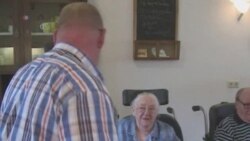WASHINGTON, D.C. —
The Netherlands has long been one of the best places to retire, largely because of the generous Dutch welfare state. But as elderly care becomes more expensive, the country is looking for new ways of providing well-being for its citizens at a lower cost. One retirement home is testing a program that aims to share the burden of costs in a unique way.
In a retirement home outside the central city of Gouda, a person can only get a place if a friend or relative agrees to participate in the care of pensioners who live there.
Henk Hom gives four hours of his time every month to the elderly, doing things like cooking, cleaning, and trying to make the daily lives of the residents more pleasant. In exchange for these services, his father can have a room.
"It's not really work. I come and see my father if he needs me, so I help, that’s normal,” said Hom.
But it's not only his father who looks forward to seeing him. Another retiree, Mrs. Lubbers, is glad to see him as well.
“It’s really good that he comes, we get to know each other. He does everything, he helps us, he’s a really good man,” said Lubbers.
The Gouda retirement home is testing the idea of a “society of participation,” conceived by Prime Minister Mark Rutte to ease some of the burden on the country's welfare system. The retirement home’s director, Sylvia Oudenes, says the system has worked smoothly so far. Of the 18 families that took part in the test program, only one family decided to go elsewhere.
“The main criticisms were about the obligatory nature. It’s a moral obligation and it’s only four hours a month. And apparently 60 percent of people doing this for a relative, friend or neighbor do well over the four hours that we ask,” said Oudenes.
The home does not depend only on volunteer work; professionals such as Rik Remmerswaal, a nurse, work there as well.
“They [the volunteers] just talk, go for walks. They don’t wash or dress them [the retirees]. They don’t help them go to the toilet, that’s what we do. The volunteers don’t provide health care, they just do the little things that we won’t always have time for,” said Remmerswaal.
By 2050, more than a quarter of the Dutch population is expected to be 65 or over. Many in the Netherlands say it is time to turn from the society of welfare into a society of sharing.
A bill before parliament is proposing to make the elderly, chronically sick or handicapped people give private lessons to children who are behind at school.
Critics have objected to what they consider the obligatory nature of such volunteer work, but Henk Hom says many others see it as a moral obligation.
In a retirement home outside the central city of Gouda, a person can only get a place if a friend or relative agrees to participate in the care of pensioners who live there.
Henk Hom gives four hours of his time every month to the elderly, doing things like cooking, cleaning, and trying to make the daily lives of the residents more pleasant. In exchange for these services, his father can have a room.
"It's not really work. I come and see my father if he needs me, so I help, that’s normal,” said Hom.
But it's not only his father who looks forward to seeing him. Another retiree, Mrs. Lubbers, is glad to see him as well.
“It’s really good that he comes, we get to know each other. He does everything, he helps us, he’s a really good man,” said Lubbers.
The Gouda retirement home is testing the idea of a “society of participation,” conceived by Prime Minister Mark Rutte to ease some of the burden on the country's welfare system. The retirement home’s director, Sylvia Oudenes, says the system has worked smoothly so far. Of the 18 families that took part in the test program, only one family decided to go elsewhere.
“The main criticisms were about the obligatory nature. It’s a moral obligation and it’s only four hours a month. And apparently 60 percent of people doing this for a relative, friend or neighbor do well over the four hours that we ask,” said Oudenes.
The home does not depend only on volunteer work; professionals such as Rik Remmerswaal, a nurse, work there as well.
“They [the volunteers] just talk, go for walks. They don’t wash or dress them [the retirees]. They don’t help them go to the toilet, that’s what we do. The volunteers don’t provide health care, they just do the little things that we won’t always have time for,” said Remmerswaal.
By 2050, more than a quarter of the Dutch population is expected to be 65 or over. Many in the Netherlands say it is time to turn from the society of welfare into a society of sharing.
A bill before parliament is proposing to make the elderly, chronically sick or handicapped people give private lessons to children who are behind at school.
Critics have objected to what they consider the obligatory nature of such volunteer work, but Henk Hom says many others see it as a moral obligation.





